Navigating the world of literary fiction can be overwhelming, with countless authors and series to explore. Yet, among these, Donna Leon stands out, creating a niche for herself with her Venetian detective novels. If you’re a fan of well-crafted crime mysteries set against the backdrop of one of the world’s most enchanting cities, Venice, then you’re in for a treat.
In this guide, we’ll introduce you to Donna Leon, her works, and why she’s a must-read.
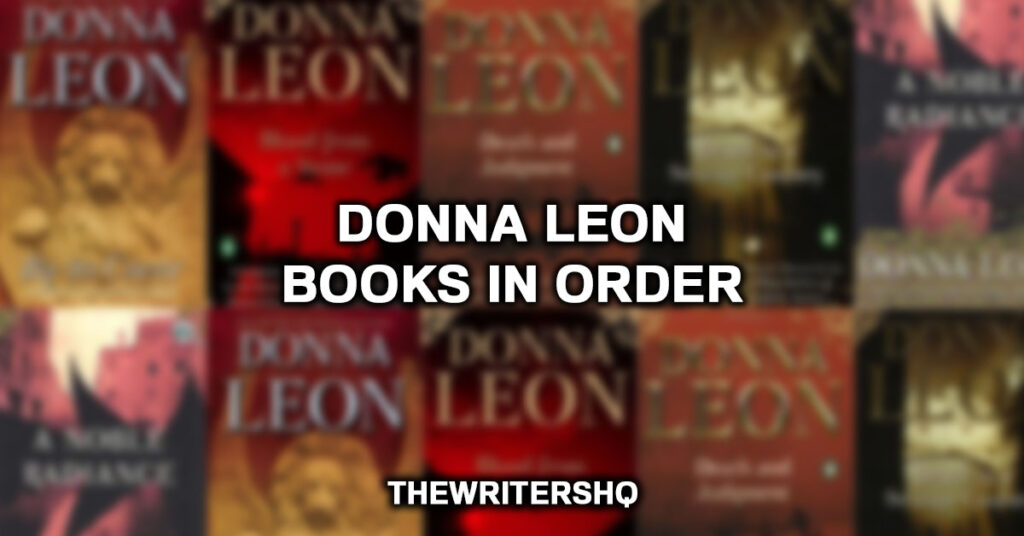
Who Is Donna Leon?
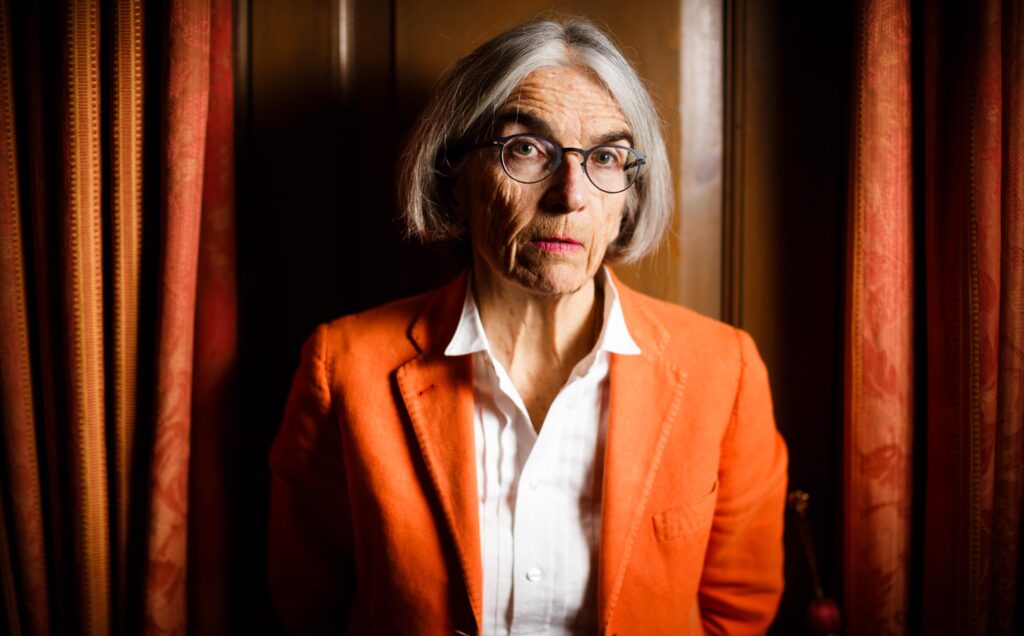
Donna Leon, born on September 29, 1942, in Montclair, New Jersey, is an American author best known for her crime novels set in Venice, Italy. These novels revolve around the investigations of the fictional hero, Commissario Guido Brunetti.
Leon lived in Venice for over three decades, where she was a lecturer in English Literature. Her deep connection and understanding of the city, its culture, and its people have intricately woven itself into her novels, offering readers not just a crime story, but a vivid and evocative portrayal of Venetian life.
What sets Donna Leon apart in the crowded crime fiction space is her emphasis on the characters and the social commentary subtly laced through her narratives. Rather than focusing solely on the ‘whodunit’ aspect, Leon’s books delve into the psyche of her characters, the ethos of Venice, and the larger issues like corruption and bureaucracy that plague societies globally.
Her first novel, “Death at La Fenice,” published in 1992, was an instant hit and set the stage for a series that has captivated readers worldwide. Since then, her Brunetti novels have become staples in the crime fiction genre, translating into numerous languages and even getting adapted into a popular German television series.
Expert Tip: Whether you’re a seasoned mystery lover or a newbie to the genre, Donna Leon’s books promise a delightful journey through the canals and alleys of Venice, with Commissario Brunetti as your guide.
Donna Leon Books In Order-Commissario Guido Brunetti Series
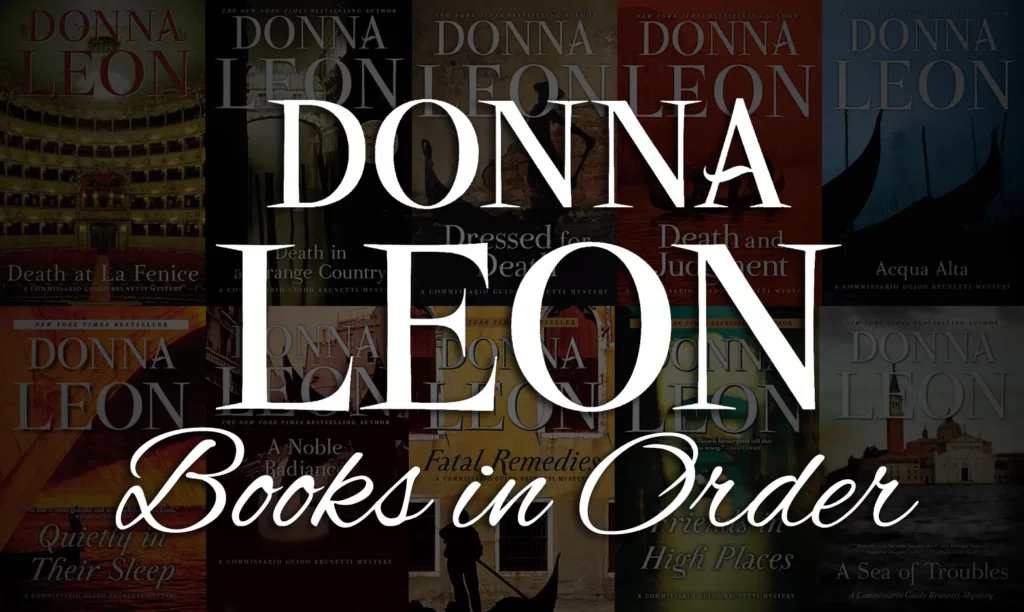
Donna Leon’s most renowned series revolves around Commissario Guido Brunetti. Here’s the list in order of publication:
- Death at La Fenice (1992)
- Death in a Strange Country (1993)
- The Anonymous Venetian (also known as Dressed for Death) (1994)
- A Venetian Reckoning (also known as Death and Judgment) (1995)
- Acqua Alta (also known as Death in High Water) (1996)
- The Death of Faith (also known as Quietly in Their Sleep) (1997)
- A Noble Radiance (1998)
- Fatal Remedies (1999)
- Friends in High Places (2000)
- A Sea of Troubles (2001)
- Wilful Behaviour (2002)
- Uniform Justice (2003)
- Doctored Evidence (2004)
- Blood from a Stone (2005)
- Through a Glass, Darkly (2006)
- Suffer the Little Children (2007)
- The Girl of His Dreams (2008)
- About Face (2009)
- A Question of Belief (2010)
- Drawing Conclusions (2011)
- Beastly Things (2012)
- The Golden Egg (2013)
- By Its Cover (2014)
- Falling in Love (2015)
- The Waters of Eternal Youth (2016)
- Earthly Remains (2017)
- The Temptation of Forgiveness (2018)
- Unto Us, a Son Is Given (2019)
- Trace Elements (2020)
- Transient Desires (2021)
- Give unto others (2022)
- So Shall You Reap (2023)
Commissario Guido Brunetti – Non-Fiction
Brunetti’s Venice: Walks with the City’s Best-Loved Detective (2009)
Donna Leon Books In Order – Standalone Novels
Though best known for her Brunetti series, Leon has also penned some standalone novels:
The Jewels of Paradise (2012)
Donna Leon Books In Order – Other Non-Fiction
Leon has also delved into non-fiction apart from her Brunetti guide:
Handel’s Bestiary: In Search of Animals in Handel’s Operas (2010)
Gondola (2013)
Do Donna Leon’s Books Need To Be Read In Order?
While each of Donna Leon’s novels presents a distinct case and can be enjoyed as a standalone, there’s a character development and narrative arc concerning Brunetti’s personal life, his family, and the evolution of his relationships at work. Reading them in order offers a richer understanding of the characters and a deeper appreciation of the series’ subtleties.
In what Order Should I Read Donna Leon’s Books In?
For a comprehensive experience, it’s suggested you start with the Brunetti series from the beginning, with “Death at La Fenice,” and proceed chronologically. After exploring the Brunetti series, you can venture into her standalone novel and then her non-fiction works.
This approach ensures you witness the evolution of Leon’s Venice, its characters, and the intricate tapestry she weaves with each narrative.
How many Inspector Brunetti books are there?
Donna Leon has written 32 books in the Commissario Guido Brunetti series.
What is the best Donna Leon?
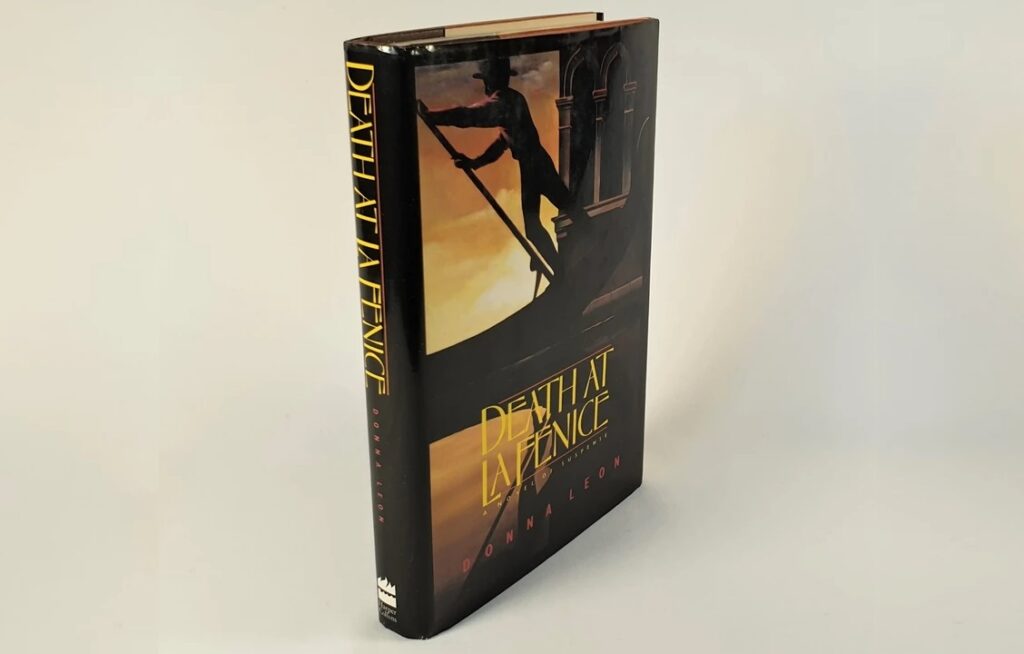
The term “best” can be subjective as it often depends on individual preferences. However, Donna Leon’s first book in the Brunetti series, “Death at La Fenice,” is widely acclaimed and set the stage for the series’ popularity. Several of her other books, such as “Acqua Alta” and “Friends in High Places,” have also been particularly well-received. Reading reviews
How many Inspector Brunetti books are there?
There are 30 books in the Commissario Guido Brunetti series written by Donna Leon.
What is the best Donna Leon?
“Best” is subjective when it comes to literature, as different readers have varying tastes. However, Donna Leon’s debut in the Brunetti series, “Death at La Fenice,” is particularly renowned and set the stage for the series’ success. Over the years, several other titles have been highly praised, but the “best” really depends on individual preference.
Who is Donna Leon married to?
Details about Donna Leon’s personal life, including her marital status, are not widely publicized as she keeps her private life out of the limelight. As of my last update, there is no confirmed information about her being married.
What nationality is Donna Leon?
Donna Leon is an American. She was born in Montclair, New Jersey, but spent many years living in Venice, Italy, where her Commissario Guido Brunetti series is set.
Summary of each book:
Death at La Fenice (1992)
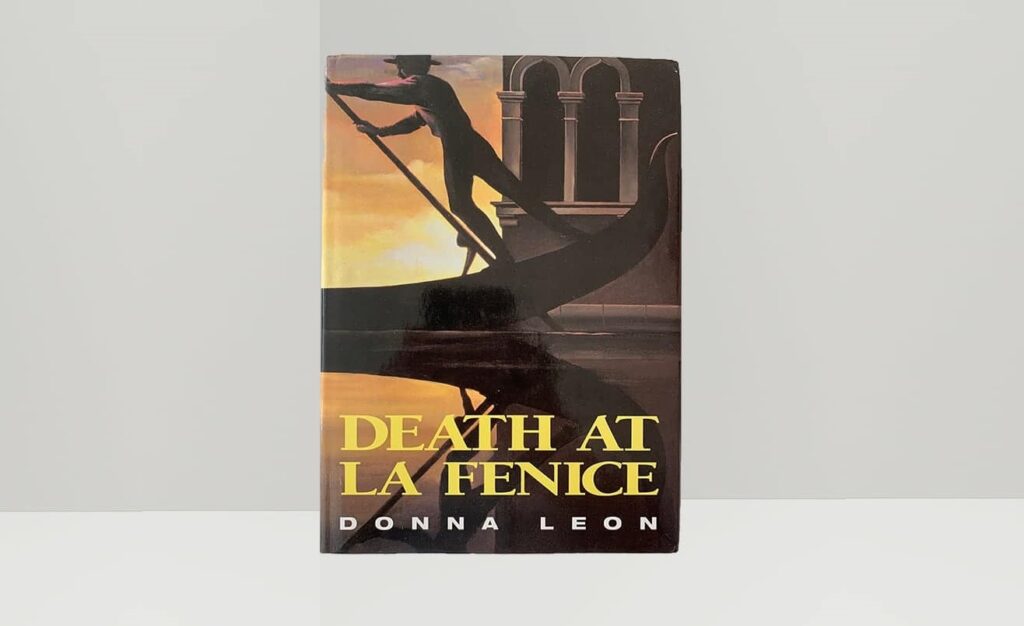
The renowned opera conductor Maestro Helmut Wellauer is found dead during a performance at Venice’s world-famous La Fenice opera house. Commissario Guido Brunetti is called in to investigate what turns out to be a case of poisoning.
Delving into the maestro’s past, Brunetti uncovers secrets, professional rivalries, and personal vendettas that might have led to his murder.
Death in a Strange Country (1993)
The body of a young American soldier is found floating in one of Venice’s canals. While officials are quick to rule it an accidental drowning, Brunetti suspects foul play. His investigation uncovers a web of drug trafficking and corruption that reaches from the streets of Venice to the U.S. Army base in Vicenza.
The Anonymous Venetian (1994)
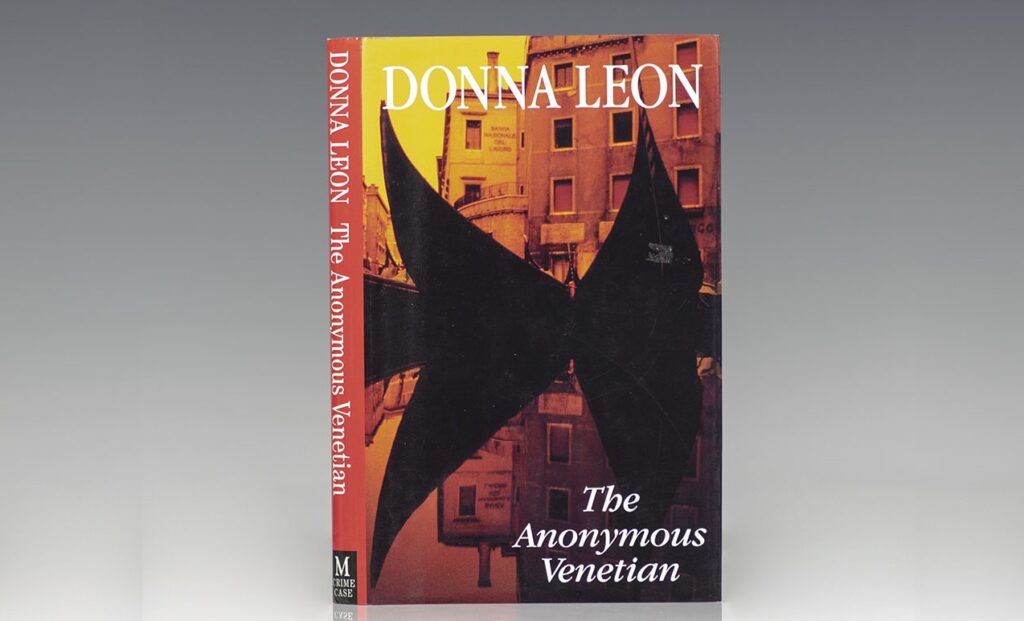
Also known as “Dressed for Death”, this installment has Brunetti investigating the death of a transgender sex worker whose body is found in a Venetian park. As Brunetti digs deeper, he discovers that the victim had connections with influential people, complicating the investigation.
A Venetian Reckoning (1995)
A prominent international lawyer is found dead in a carriage accident. But inconsistencies in the case lead Brunetti to suspect it’s more than a simple accident. As he delves into the lawyer’s dealings, he uncovers a connection to the Mafia and a web of corruption at the highest levels of society.
Acqua Alta (1996)
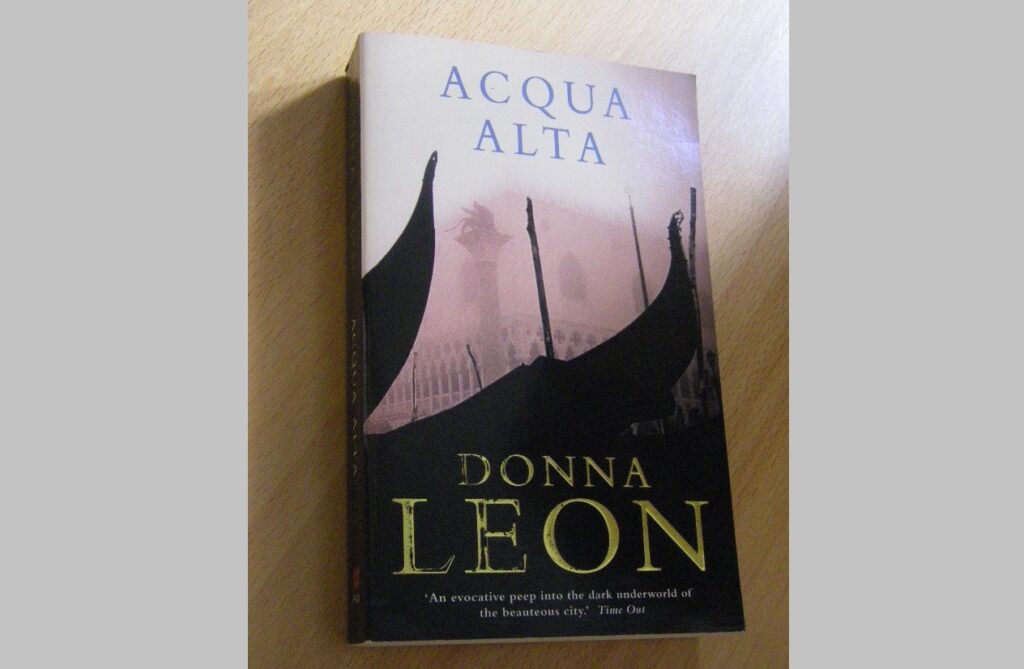
During Venice’s acqua alta (high water) season, an art historian is brutally attacked in her apartment, and some valuable Chinese pottery is stolen. As Brunetti searches for connections, he discovers links to international art theft and dodgy deals that hint at larger conspiracies.
The Death of Faith (1997)
Known as “Quietly in Their Sleep” in some editions, this novel sees Brunetti probing the mysterious circumstances surrounding the death of a nun. His inquiries lead him to suspect that the nursing home where she worked is not all it seems, and as he digs deeper, he uncovers a scandal involving the Church.
A Noble Radiance (1998)
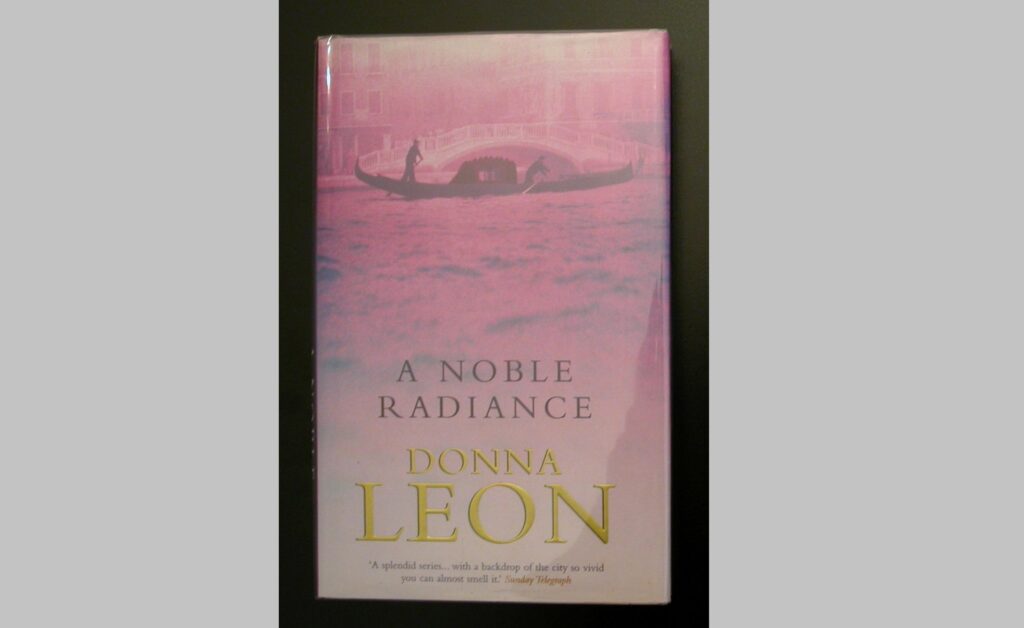
A body is discovered in a field, believed to be that of the missing son of a local noble family. As Brunetti investigates, he ventures into the world of the Venetian aristocracy, uncovering a tale of jealousy, secrets, and family rivalries.
Fatal Remedies (1999)
The narrative takes a personal turn when Brunetti’s wife, Paola, protests a travel agency’s involvement in the sex tourism industry by vandalizing its windows. But things take a darker turn when the travel agency’s owner is found dead. Brunetti must balance his duty with his familial loyalties.
Friends in High Places (2000)
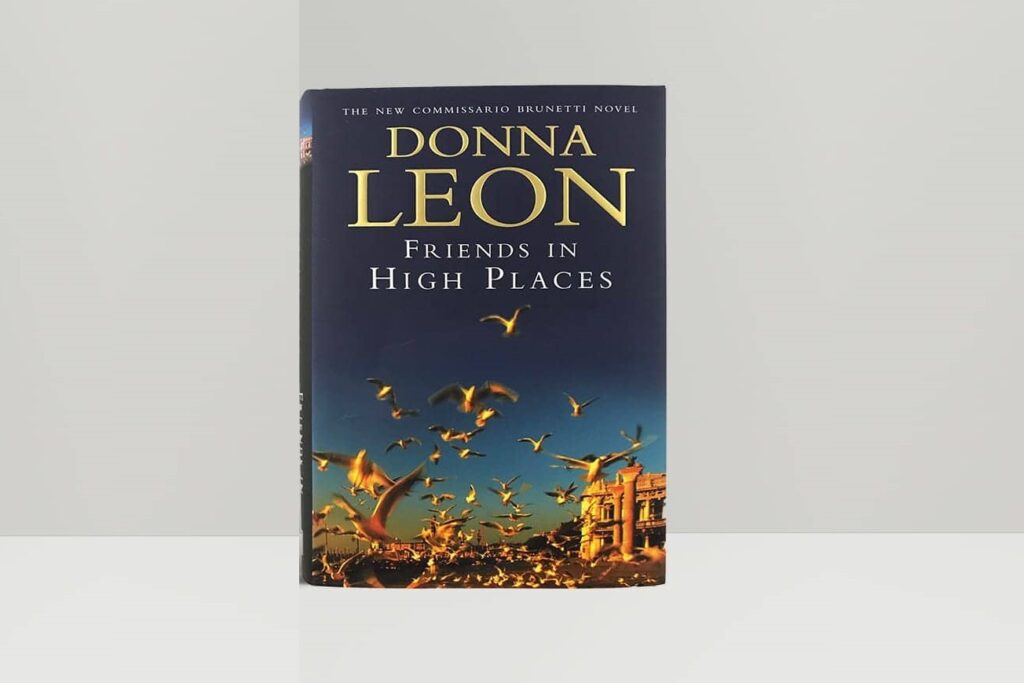
Brunetti faces housing issues when he learns his apartment lacks the necessary permits. But when the bureaucrat who can help him is found dead, Brunetti’s professional and personal worlds collide. He discovers that Venice’s housing crisis is deeply entangled with corruption and greed.
A Sea of Troubles (2001)
Brunetti is called to investigate when two fishermen are found murdered on the Venetian island of Pellestrina. Brunetti’s quest for justice is complicated by the close-knit nature of the island community. With the help of the island’s postmistress, he delves into the fishermen’s world and uncovers secrets that many would prefer to remain buried.
Each of these novels combines meticulous detective work with rich portrayals of Venetian life, making them not just mysteries but also evocative tales of a city and its people.
Wilful Behaviour (2002)
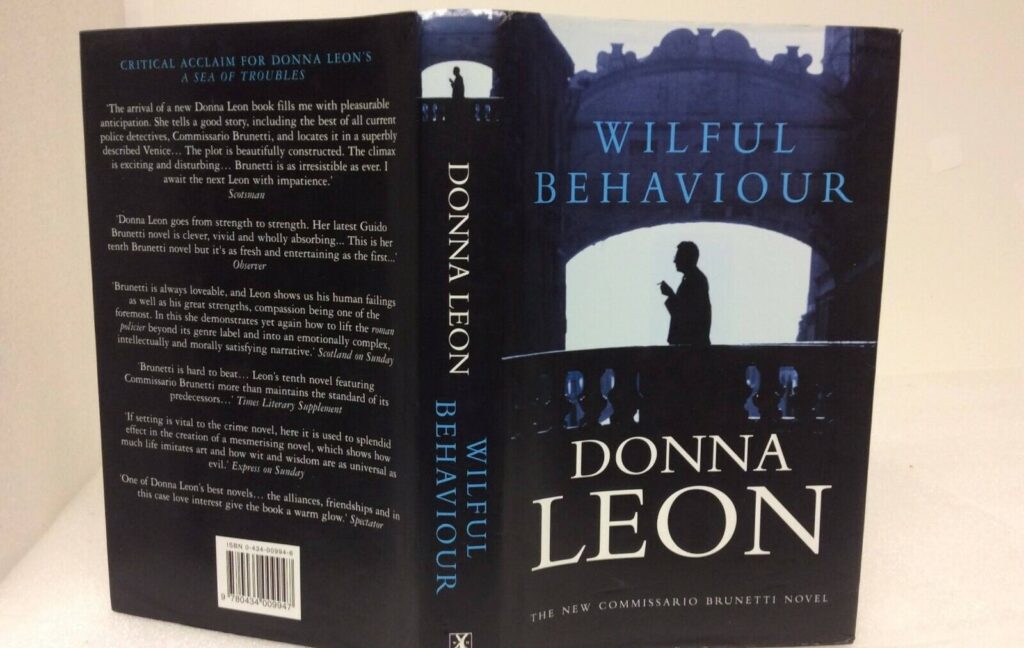
A young student consults Brunetti about a family heirloom, hinting at potential legal complications. Shortly after, she is found stabbed to death. As Brunetti delves into her past, he discovers dark secrets from the Venetian black market art world, possibly related to WWII looted art.
Uniform Justice (2003)
The son of an ex-politician is found dead in a prestigious military academy. Initial assumptions lean towards suicide, but Brunetti senses foul play. He faces stiff resistance from the academy and delves into the boy’s family life, uncovering political scandals, mysteries, and long-held grudges.
Doctored Evidence (2004)
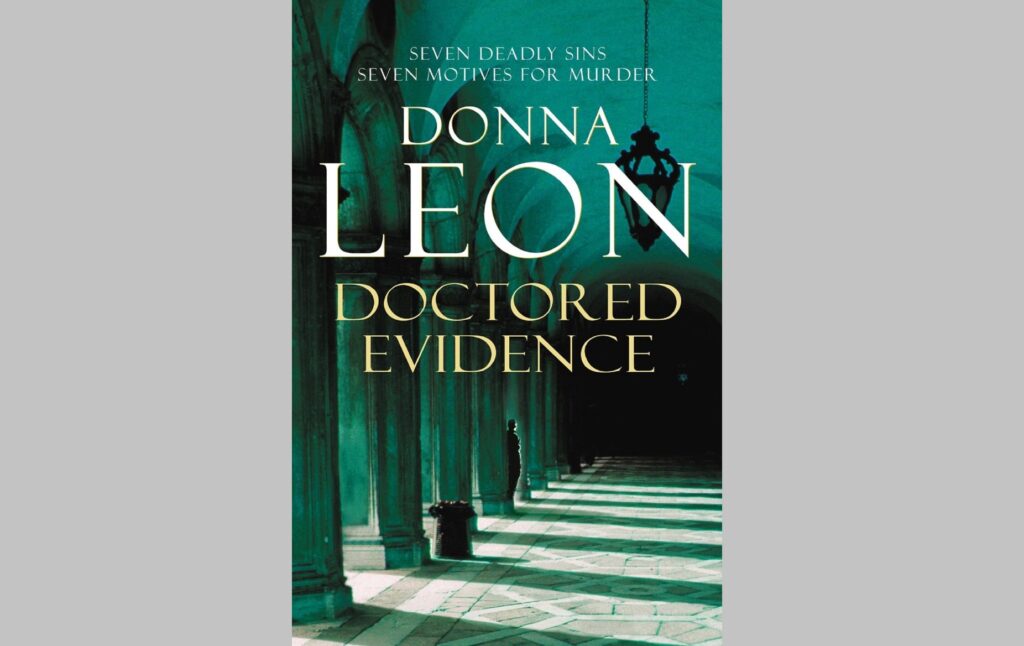
A Romanian cleaner is suspected of killing her employer but is later found dead herself. As Brunetti investigates, he begins to doubt the cleaner’s guilt in the initial murder. This case takes Brunetti through Venice’s immigrant community, highlighting issues of prejudice and exploitation.
Blood from a Stone (2005)
Days before Christmas, a Senegalese street vendor is shot dead in Venice. The apparent racist undertones of the crime concern Brunetti, who soon discovers that the murder might be linked to the illegal diamond trade and not just a random act of violence.
Through a Glass, Darkly (2006)
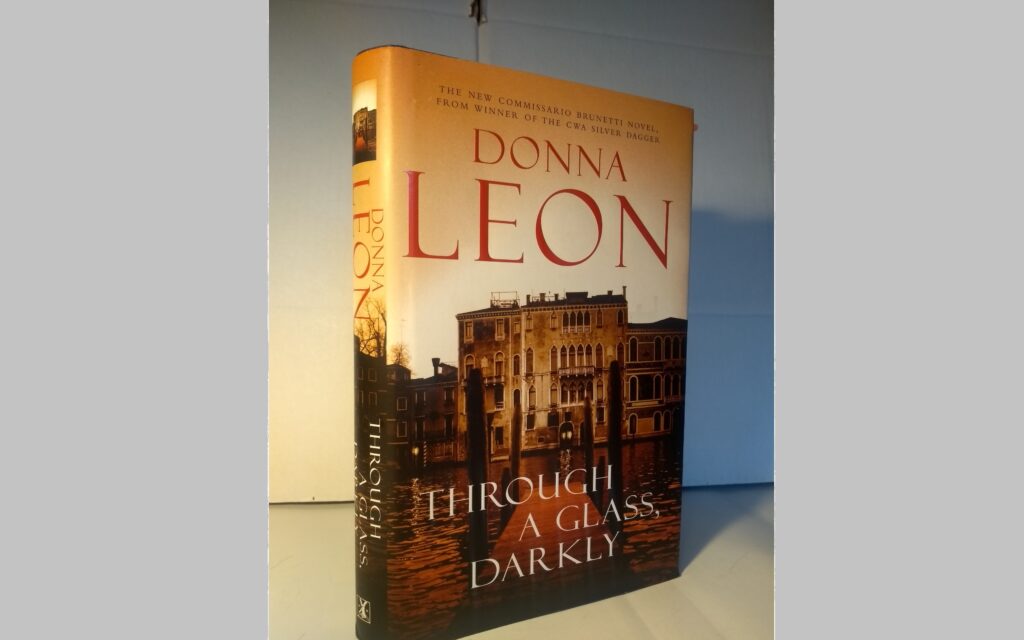
Brunetti investigates the suspicious death of a night watchman, found dead at the glass foundry of a Murano glass factory. He discovers environmental concerns and family tensions at the heart of the case, with the pristine waters of Venice under threat.
Suffer the Little Children (2007)
Brunetti faces a troubling case when a local pediatrician is brutally attacked and his 18-month-old son is taken away. The investigation reveals a controversial decision by the doctor regarding a child’s adoption, leading Brunetti into the complex and shadowy world of adoption and child custody.
The Girl of His Dreams (2008)
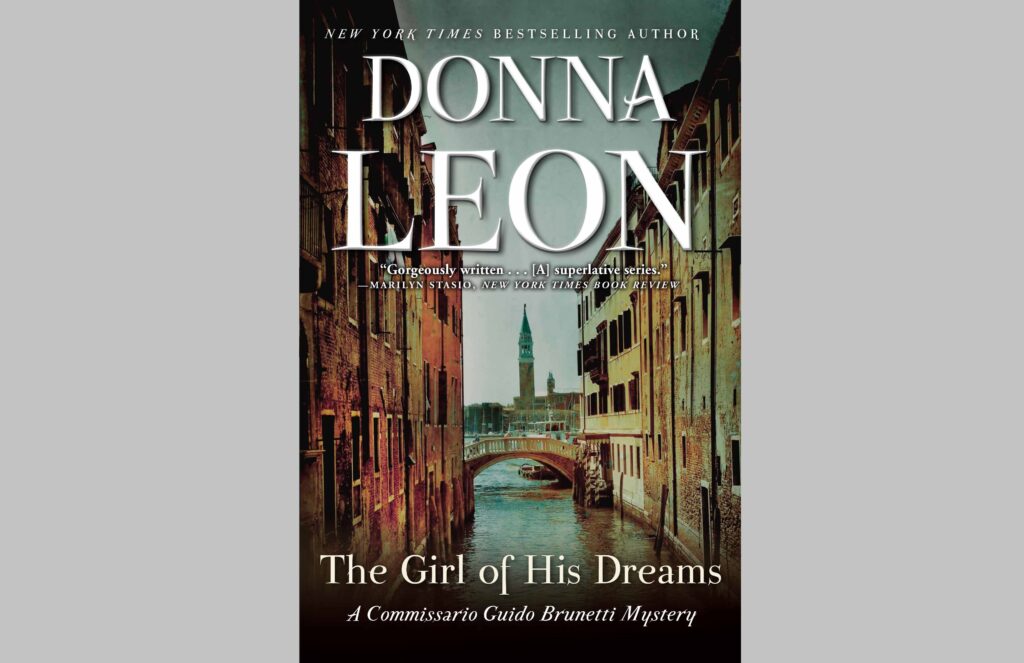
While the Brunetti family mourns the loss of Brunetti’s mother, he is drawn into a case involving the death of a young Gypsy girl who drowned in a canal. Navigating through the intricate maze of Venetian prejudices and the insular Gypsy community, Brunetti tries to seek justice for the young victim.
About Face (2009)
At a dinner party, Brunetti meets a woman with a mysterious disfigurement. He soon discovers she’s connected to his father-in-law and to a shady businessman involved in illegal dumping. As Brunetti delves deeper, he confronts environmental crimes that put the city and its residents at risk.
A Question of Belief (2010)
As Venice swelters in a summer heatwave, Brunetti faces a moral dilemma. A court clerk raises suspicions about a Venetian judge’s involvement in corruption and kickbacks. But without concrete evidence, Brunetti must tread carefully in this tale of belief, disillusionment, and the conflict of personal ethics.
Drawing Conclusions (2011)
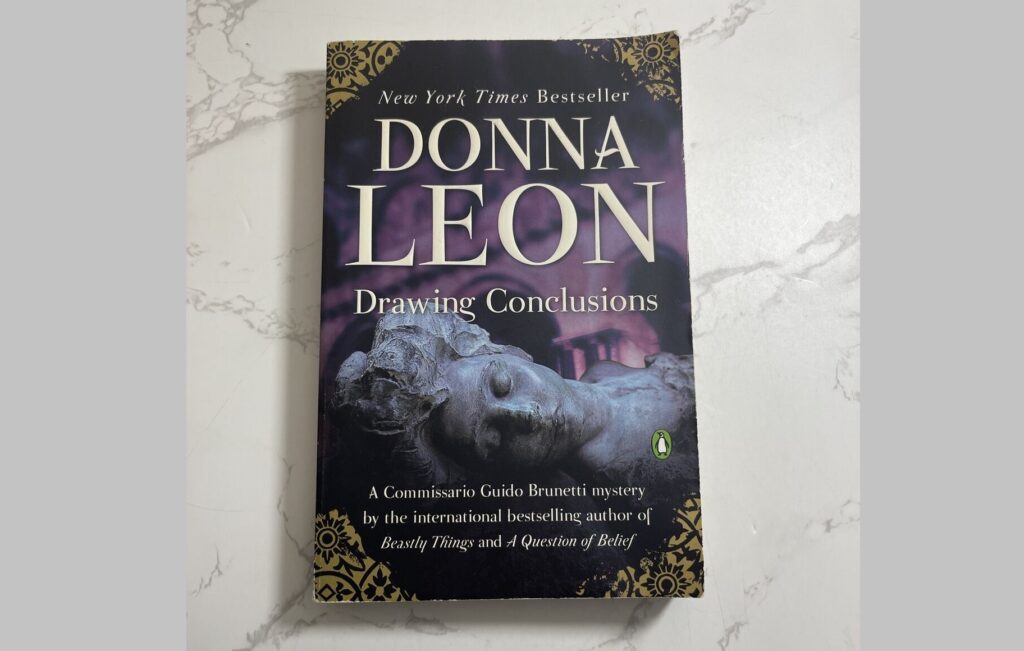
A widow in her sixties is found dead in her apartment. The authorities are quick to dismiss it as natural causes, but Brunetti believes there’s more than meets the eye. His investigations reveal a complicated past and dark secrets, leading him into the world of Venice’s contemporary art scene.
Beastly Things (2012)
A body with strange lesions is found floating in a canal. Brunetti identifies the man as a local veterinarian. Delving into the vet’s life, Brunetti discovers connections to the local meat industry, questionable practices, and a possible motive for murder related to environmental concerns.
The Golden Egg (2013)
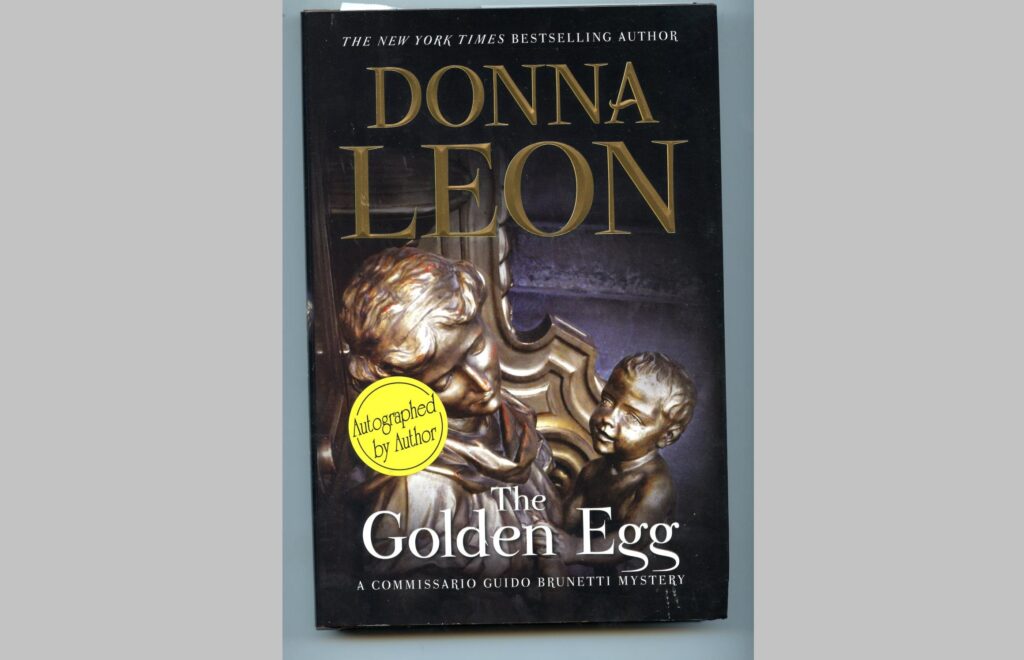
A man, deaf and mentally challenged, dies in his sleep. Initially thought to be of natural causes, Brunetti is suspicious due to the lack of any official medical or familial records. His investigation reveals societal neglect, greed, and the tragic cost of secrets and indifference.
By Its Cover (2014)
Rare books and pages are stolen from a prestigious library. Brunetti investigates the world of bibliophiles and collectors. The case turns graver when a library employee is found dead. Brunetti confronts questions of the value of literature and the lengths to which people will go for their obsessions.
Falling in Love (2015)
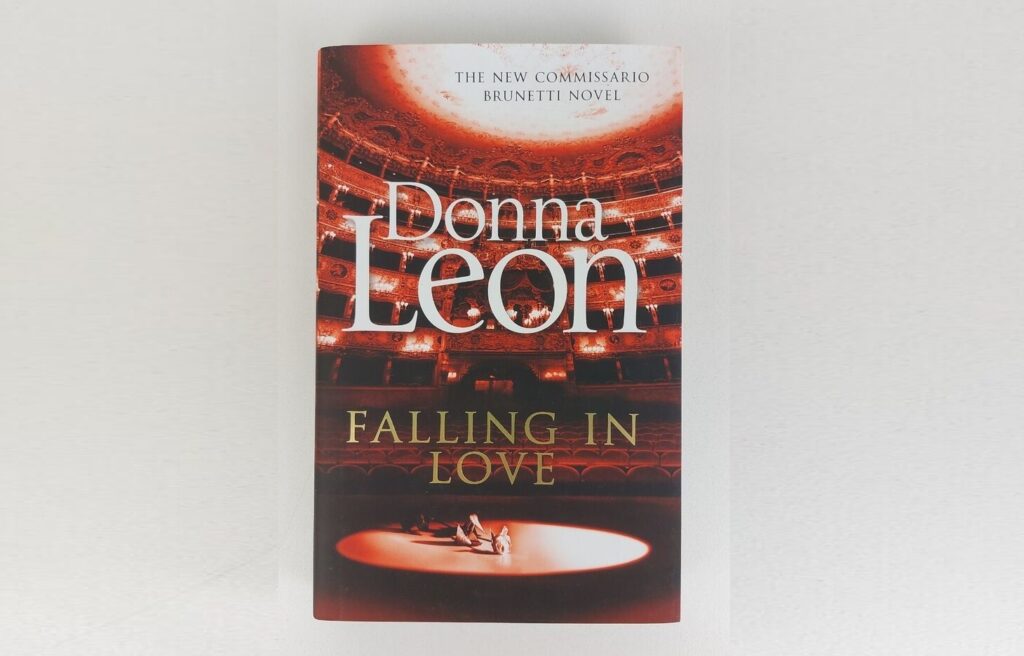
Opera singer Flavia Petrelli returns to Venice and becomes the target of a stalker. Brunetti recalls investigating her in “Death at La Fenice” but now must protect her. As events escalate from flowers and gifts to a near-lethal attack, Brunetti races to unmask the obsessive admirer before it’s too late.
The Waters of Eternal Youth (2016)
Brunetti investigates a cold case at the request of a family friend. A girl, now suffering permanent mental damage, almost drowned 15 years earlier. As Brunetti delves into the past, he unravels a story of young love, jealousy, and a crime that was never reported.
Earthly Remains (2017)
Needing a break from the city, Brunetti ends up on Sant’Erasmo island. His respite is interrupted when his host goes missing after a storm. In his search, Brunetti is faced with the realities of the natural world, environmental decay, and the consequences of greed.
The Temptation of Forgiveness (2018)
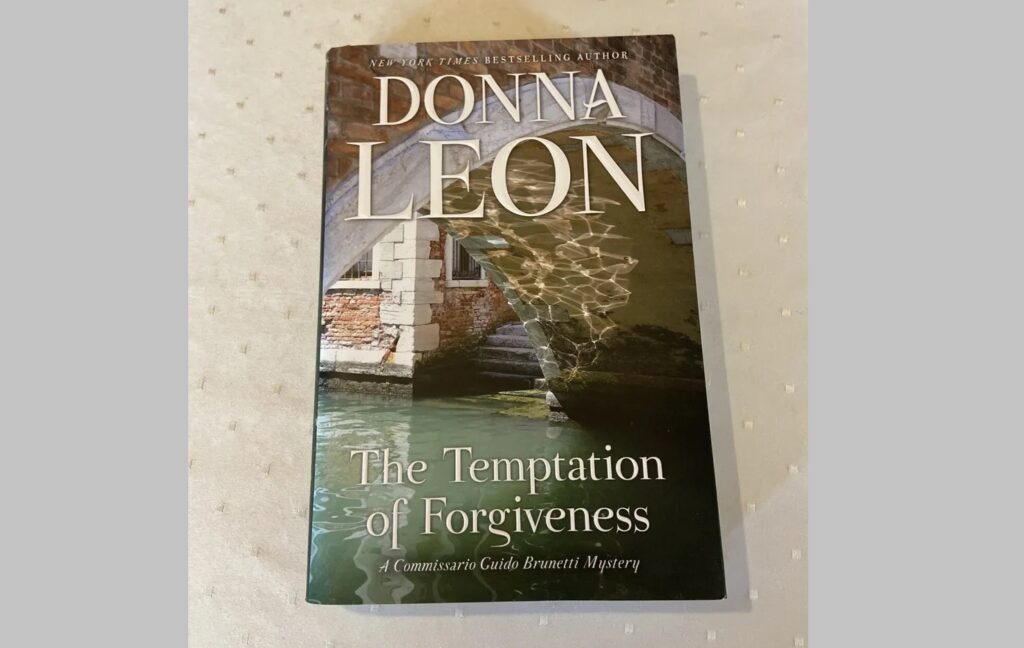
A friend of Brunetti’s wife comes to him with concerns about her son’s drug use. When her husband is found with a severe brain injury at the foot of a bridge, Brunetti suspects a connection. The investigation leads him into Venice’s drug scene and challenges his notions of justice and retribution.
Unto Us, a Son Is Given (2019)
An old family friend of Brunetti plans to adopt a much younger man, raising eyebrows in Venetian society. When the friend drops dead suddenly, Brunetti is plunged into a world of long-held secrets, family dynamics, and motives for murder tied to love and inheritance.
Trace Elements (2020)
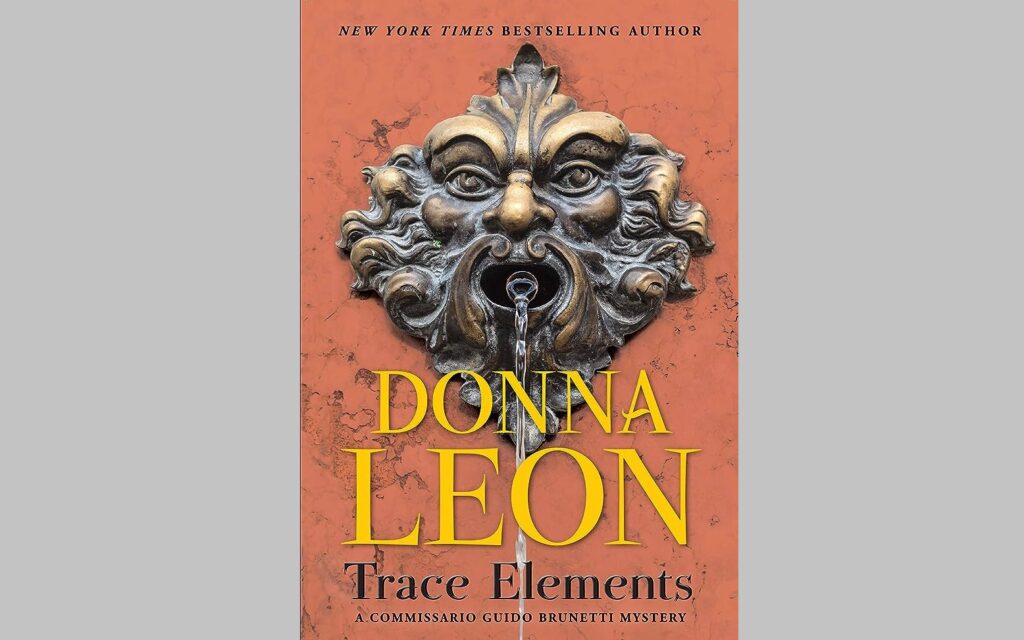
A woman dying from a suspicious drug interaction hints at possible foul play, whispering about her husband’s “bad intentions.” Brunetti delves into the world of Venice’s glassblowing industry and discovers dark secrets, corporate espionage, and potential environmental crimes.
Transient Desires (2021)
Two young American tourists are left injured outside a hospital. The two young men they were with, responsible for the accident, flee the scene but are soon caught. As Brunetti investigates, he uncovers a deeper story of love and desperation, revealing the transient nature of youth and emotions.
Throughout these novels, Donna Leon masterfully blends the intricacies of Venetian life and culture with the challenges of modern society, all the while maintaining a suspenseful narrative that keeps readers engaged.
Other books:
Standalone Novels:
- The Jewels of Paradise (2012)
Caterina Pellegrini, a native Venetian with a doctorate in baroque opera, is drawn into a mystery when she’s hired to research the contents of two locked chests belonging to a once-famous baroque composer. As she delves into historical documents, she uncovers a tale of intrigue, greed, and possibly murder.
Non-Fiction:
- Brunetti’s Venice: Walks with the City’s Best-Loved Detective (2009)
A tour of the Venice of Donna Leon’s novels. This book features thematic walks through the city that will appeal to both Brunetti fans and travel enthusiasts. - Brunetti’s Cookbook (2010)
Together with Roberta Pianaro, Donna Leon offers a collection of delicious recipes and extracts from her novels. The book celebrates the passion for food and life of the Venetian detective, Guido Brunetti. - My Venice and Other Essays (2013)
A collection of personal essays where Donna Leon shares her insights and experiences from her many years living in Venice. Topics range from the challenges of life in Venice to the joys of aging, and many others. - Gondola (2013)
A book featuring a CD of Barcarole, popular boat songs, along with beautiful woodcut illustrations and lyrics. Donna Leon provides background information on the history of gondolas and gondoliers, adding depth and context to the music.
How does Donna Leon’s portrayal of Venice in her Commissario Guido Brunetti series differ from the typical tourist perspective of the city?
Donna Leon presents Venice as a living, breathing entity, beyond the glistening canals and picturesque squares typically marketed to tourists.
Quick Fact: Through the eyes of Commissario Guido Brunetti, readers get a sense of the real Venice its neighborhoods, local hangouts, family dynamics, political underpinnings, and the challenges the city faces, from corruption to environmental threats.
While the city’s iconic beauty is never understated, it’s the cultural nuances, societal observations, and the deep connection the characters have with the city that offer readers a deeper, more intimate view of Venice.
How does Donna Leon weave contemporary issues into her novels, and why might this be significant for her readership?
Throughout her series, Leon addresses various contemporary issues such as environmental degradation, immigration, racial prejudice, and political corruption. For instance, in “Beastly Things,” she delves into the meat industry’s dark side, while in “Earthly Remains,” the focus is on environmental decay.
By integrating these themes into her detective novels, Leon not only keeps her plots relevant and timely but also engages her readers in meaningful reflections about these real-world challenges. Her readership is thus prompted to think beyond the narrative, contemplating larger societal and ethical dilemmas.
What makes the character of Commissario Guido Brunetti relatable and endearing to the readers?
Commissario Guido Brunetti, despite his position of authority as a detective, is portrayed as a deeply human character. He’s a loving family man, often seen interacting with his wife and children, discussing literature, or having a family meal. These slices of domestic life offer a contrast to his often grim professional tasks.
Moreover, Brunetti often grapples with moral dilemmas, showcasing his introspective side. His frequent reflections on justice, society, and personal ethics resonate with readers, making him more than just a fictional detective but a character with whom many can empathize and connect.
Apart from the detective narrative, what elements of Italian culture are prominently featured in Donna Leon’s books?
Food and literature are two dominant elements of Italian culture woven into Leon’s narratives. Brunetti often finds solace in the meals lovingly prepared by his wife, Paola, or in the bustling trattorias of Venice. The descriptions of these meals are vivid and evoke a sensory experience of Italian cuisine.
Additionally, literature frequently finds its way into the narrative, with Brunetti and his family often discussing books and authors, further immersing the reader in Italian intellectual life.
How does the city of Venice itself become a character in Donna Leon’s series?
Venice is not just a backdrop in Leon’s series; it’s an intricate, living character. The city’s unique architecture, winding canals, historic landmarks, and rhythm of life are interwoven into the storylines. The challenges Venice faces, such as rising water levels, tourism pressures, or the intricacies of navigating its waterways, become pivotal plot points.
As Brunetti moves through the city, readers are taken on a journey through its calles and campos, with the city’s mood, weather, and ambiance influencing the narrative’s tone.
How does Donna Leon’s personal connection with Venice influence her storytelling?
Leon lived in Venice for many years, and her personal experiences and observations have undoubtedly shaped her portrayal of the city and its residents. Her intricate descriptions of Venice’s locales, the nuanced understanding of Venetian politics and society, and the vivid depiction of everyday Venetian life all speak to someone deeply familiar with the city.
This intimate knowledge allows her to craft stories that are authentic, providing readers with an insider’s view of Venice.
While the Commissario Guido Brunetti series is predominantly a detective series, how does Donna Leon explore the complexities of family dynamics through the protagonist’s personal life?
Family plays a central role in many of the novels. Brunetti’s interactions with his wife, Paola, their children, Raffi and Chiara, and even his in-laws, provide insights into his character beyond his professional persona. Through these interactions, Leon explores universal themes of love, conflict, understanding, and generational differences.
Whether it’s a casual dinner conversation, Paola’s passionate outbursts about societal issues, or Brunetti’s reflections on his relationship with his children, these moments offer a lens into the Italian family’s heart and soul, juxtaposing the domestic world with the external world of crime and investigation.
Beyond the mysteries and crimes, what deeper themes does Donna Leon explore in her Commissario Guido Brunetti series?
At the core of Leon’s series is a profound exploration of human nature, morality, and the intricate web of societal relations. Through the character of Brunetti, the stories grapple with the grey areas of justice and the often-blurred line between right and wrong.
The books shed light on the complexities of bureaucracy, the influence of power and money, and the frequent clash between personal ethics and professional duties. As readers navigate through the canals and alleys of Venice with Brunetti, they’re also led on a journey into the depths of human emotions, relationships, and the difficult choices that life often presents.
How does Donna Leon’s background in literature and her academic pursuits reflect in her novels?
Leon’s background in literature shines through in the intellectual depth of her characters, especially Brunetti. His frequent reflections on classical literature, his deep conversations with colleagues and family about books, and the way literary allusions are woven into the fabric of the narrative all echo the author’s academic inclinations.
Moreover, the nuanced narrative structures, intricate character developments, and layered storylines allude to an author who is well-versed in the art of classical storytelling.
While Brunetti remains the anchor of the series, the secondary characters provide depth, diversity, and richness to the Venetian canvas that Leon paints. Characters like Vianello, Brunetti’s loyal deputy, or Signorina Elettra, the enigmatic secretary with exceptional skills in information gathering, play pivotal roles in advancing the plots.
They bring varied perspectives, backgrounds, and ethics to the table, creating a multifaceted narrative where every character, no matter how minor, has a role to play and a story to tell.
In what ways does the series highlight the challenges and contradictions of modern-day Venice?
Leon’s depiction of Venice goes beyond its romantic façade. Through her stories, readers are exposed to the challenges the city faces, from over-tourism and its impact on local life to the environmental threats of rising sea levels and pollution.
There are also undercurrents of political corruption, societal inequalities, and the daily struggles of Venetians trying to preserve their way of life in a rapidly changing world. These contradictions serve as a stark contrast to the timeless beauty and allure of the city, offering a more grounded and realistic view of Venice.
How does food play a role in the narrative, and what does it signify in the broader context of the series?
In the Brunetti series, food is not merely sustenance; it’s an embodiment of culture, tradition, and familial bonds. The detailed descriptions of meals, whether at Brunetti’s home or in local trattorias, are symbolic of the Italian zest for life and the importance of family.
These culinary interludes serve as moments of respite from the tense investigations, grounding the narrative in the sensory pleasures of life. They remind readers of the beauty of simple pleasures and the importance of pausing to savor life’s flavors amidst its chaos.
In the portrayal of crime and justice in the series, how does Donna Leon challenge conventional detective story tropes?
While the series follows the structure of detective fiction, Leon frequently subverts traditional expectations. Not all stories conclude with clear-cut justice. There are times when Brunetti, despite knowing the perpetrator, is unable to bring them to book due to bureaucratic hurdles or societal pressures.
Such outcomes emphasize the messy realities of justice, challenging the black-and-white notions of right and wrong commonly found in the genre.
How does Leon’s diverse cast of characters reflect the multicultural and ever-evolving nature of Venice?
Though rooted in the Venetian tradition, Leon’s stories are peppered with characters from varied ethnicities and backgrounds, reflecting the city’s historical role as a melting pot of cultures. From immigrants seeking a better life to foreign tourists leaving their mark on the city, the diverse characters highlight the global influences that have shaped Venice.
This multicultural dimension adds layers of complexity to the narrative, pushing readers to consider broader themes of identity, belonging, and change.
Conclusion
Donna Leon’s Commissario Guido Brunetti series is not just a testament to her prowess as a mystery writer but a profound exploration into the human psyche, societal complexities, and the ever-evolving tapestry of Venice. Each book, while unraveling a crime, also delves deep into the intricacies of relationships, ethics, and the challenges of modern life.
Leon’s richly detailed narratives, filled with multidimensional characters, culinary delights, and thought-provoking themes, make her works stand out, offering readers a mesmerizing blend of suspense, culture, and introspection.
In the bustling canals and narrow alleys of her Venetian world, readers find a mirror reflecting the broader human experience, making every story resonate on a universally profound level.
